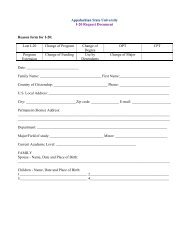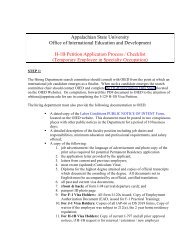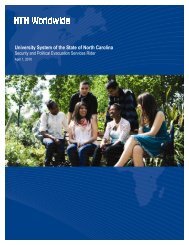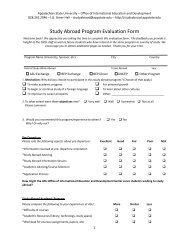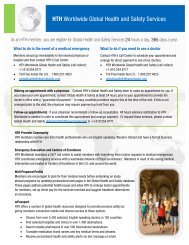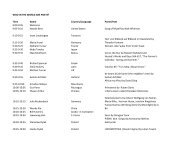Program Leader Handbook - International Education and ...
Program Leader Handbook - International Education and ...
Program Leader Handbook - International Education and ...
You also want an ePaper? Increase the reach of your titles
YUMPU automatically turns print PDFs into web optimized ePapers that Google loves.
Appalachian Overseas <strong>Education</strong> <strong>Program</strong>s <strong>Program</strong> <strong>Leader</strong> <strong>H<strong>and</strong>book</strong><br />
3. In-Country Logistical Information<br />
37<br />
<br />
<br />
<br />
<br />
<br />
<br />
<br />
<br />
<br />
<br />
Distribute a detailed itinerary <strong>and</strong> schedule of the program activities <strong>and</strong> sites, including addresses <strong>and</strong> phone numbers.<br />
Maps should be available. The schedule should also specify which activities are outside the scope of course work <strong>and</strong><br />
when students are allowed “free time”.<br />
Discuss housing <strong>and</strong> meal arrangements.<br />
Provide host family contact information <strong>and</strong> related rules (if applicable).<br />
If you consent to the students leaving the program site <strong>and</strong> traveling independently on occasions when no classes are<br />
taught <strong>and</strong> no cultural activities are scheduled, please add your program specific information to the “Assumption of Risk<br />
Indemnification Agreement - Independent Travel <strong>and</strong> Activities” form (see copy on Appendix L) <strong>and</strong> ask all your students<br />
to read/sign/return this form to you. Please forward those forms to OIED. It is important that you check that all students<br />
who sign the document are over 18 years of age, as you will need a parental signature if they are not. OIED usually<br />
emails you this form about 6-8 weeks prior to departure. Students are required to let you know where they are going<br />
<strong>and</strong> when they expect to be back to the program site (they should leave their itinerary <strong>and</strong> contact information with you).<br />
Explain how to make phone calls from <strong>and</strong> to the program sites <strong>and</strong> where students can have internet/e-mail access,<br />
while going over your program specific phone/e-mail communication rules. Remind students of time change differences.<br />
If you wish to discourage communication with family <strong>and</strong> friends back home as part of the cultural immersion experience<br />
(except for emergency situations), please make sure that you clearly explain the rationale. Remind students who are planning<br />
to use their personal cell phones to ensure that they will have international calling access <strong>and</strong> to check with their cell<br />
phone providers about what options are available to them. Cell phones can be a great help in that they allow parents <strong>and</strong><br />
friends to contact students directly without waiting to be passed through a receptionist in a dormitory or having to learn<br />
the local language to leave a message. Cell phones have also lightened the stress <strong>and</strong> tension related to telephone use in<br />
home-stay situations. You may want to indicate the possibility of buying or renting a cell phone in country if you have<br />
researched that this may be a good option on the program site.<br />
Discuss money matters such as:<br />
- Amount of spending money needed, currency, exchange rate, safe ways to withdraw <strong>and</strong> carry cash, uses of debit <strong>and</strong><br />
credit cards, <strong>and</strong> the practicality (or not) of carrying travelers’ checks. If students are planning to bring travelers’ checks,<br />
they should leave a copy of the serial numbers with a friend or relative at home <strong>and</strong> carry their copy in a separate place<br />
<strong>and</strong> cross their numbers off the list as checks are cashed.<br />
- Discuss the cost of exchanging money at an airport versus making an ATM withdrawal inside a traditional bank in town.<br />
You may want to advise the students to call their banking institution prior to departure to notify them of upcoming overseas<br />
charges <strong>and</strong> to inquire about cash limits abroad. Remind participants to note credit limits on each credit card brought,<br />
<strong>and</strong> to inquire how to report to the bank the loss of a card from overseas as 800 numbers don’t work from abroad.<br />
- Mention that some students <strong>and</strong> their families enjoy the convenience of opening a separate bank account linked to a separate<br />
bank card to manage their funding <strong>and</strong> spending overseas. Students should inquire about options with their bank.<br />
Explain the local transportation system with city maps or guides.<br />
Discuss the practicality of carrying an international student ID card in your program destination<br />
Discuss where to get basic necessities on site such as food, money, laundry service, post office, etc. Provide maps.<br />
Discuss possible issues with different electrical sockets <strong>and</strong> voltages <strong>and</strong> need for converters.<br />
Revision Date 5/8/13<br />
507_AOEP_<strong>Leader</strong><strong>H<strong>and</strong>book</strong>



